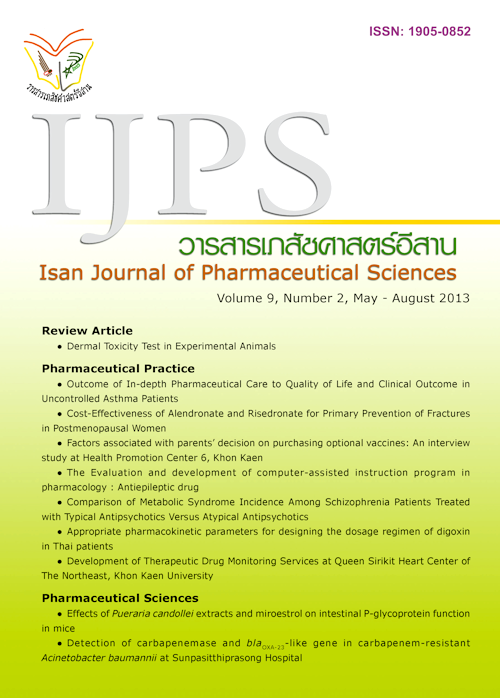Comparison of Metabolic Syndrome Incidence Among Schizophrenia Patients Treated with Typical Antipsychotics Versus Atypical Antipsychotics
Main Article Content
Abstract
Introduction: People who are experiencing to be schizophrenia are found to take a risk in mortality approximately 2-3 times compared with general population resulting from cardiovascular disease. Moreover, schizophrenia has been indicated to be associated with metabolic syndrome. As a result of metabolic syndrome is more likely to link to cardiovascular disease. The objectives of this study were to find the incidence of metabolic syndrome resulting from atypical antipsychotics comparing with typical antispychotics and to determine risk factors which related to metabolic syndrome. Materials and Methods: A cohort study was used to find out the results in this research. Participants were 39 patients who have been diagnosed and treated with antipsychotics during the 1st May 2011 to the 30th April 2012 from Prasrimahabhodi Psychiatric Hospital. They were investigated by laboratory for testing glucose, high density lipoprotein, triglyceride, measuring blood pressure and waist circumference. They were tested for setting to be baseline in the first time and then compared with the result of test on three months during study were period. Updated ATP III and IDF 2005 were used to be standard measurement in this study. Results: The results of this study found that the incident of metabolic syndrome in schizophrenia patients who had been treated with atypical antipsychotics according to Updated ATP III were 18.88 percent while incident of metabolic syndrome in typical antipsychotics was shown accounting for 5.88 percent. The result from comparing between atypical and typical antipsychotics indicated relative risk accounting for 3.09 (95% CI= 0.38-25.19). The incident of metabolic syndrome in schizophrenia patients who had been treated with atypical antipsychotics according to Updated IDF 2005 were 16.77 percent but not found the incident of metabolic syndrome in typical antipsychotics. There was not any risk factor related to metabolic syndrome including gender, marginal status, education, occupation, health right, family history, alcohol drinking, smoking and type of antipsychotics. Conclusions: Although the relative risk did not show statistical significance, atypical antipsychotics had a higher incidence of metabolic syndrome when compared to typical antipsychotics. Thus, baseline and routine follow-up of metabolic parameters are recommended for patients taking atypical antipsychotics.
Article Details
In the case that some parts are used by others The author must Confirm that obtaining permission to use some of the original authors. And must attach evidence That the permission has been included
References
De Hert M, Schreurs V, Vancampfort D, Van Winkel R. Metabolic syndrome in people with schizophrenia: a review special article. World Psychiatry 2009 : 8:15-22.
Grundy SM, Hansen B, Smith SC, et al. Clinical management of metabolic syndrome: Report of the National Heart, Lung and Blood Instit ute/American Heart Association/National Heart, Lung, and Blood Institute/ American Diabetes Association conference on scientific issues related to management. Circulation 2004;109:551-556.
Ishizaka N, Ishizaka Y, Toda E, et al. Association between cigarette smoking, metabolic syndrome, and carotid arteriosclerosis in Japanese individuals. Atherosclerosis vol. 181 issue 2 August, 2005. p. 381-388.
Lekskulchai V.Toxicity of cigarette smoke . J Health Res 2007;21(4):287-292.
McEvoy JP, Meyer JM, Goff DC et al. Prevalence of the metabolic syndrome in patients with schizophrenia:
baseline results from the Clinical Antipsychotic Trials of Intervention Effectiveness (CATIE) schizophrenia trial and comparison with national estimates from NHANES III. Schizophr Res 2005; 80:19-32.
Newcomer JW. Metabolic syndrome and mental illness. Am J Manag Care. 2007 Nov;13(7 Suppl):S170-177.
Park YW, Zhu S, Palaniappan L et al. The metabolic syndrome : prevalence and associated risk factor finding in the US population from the third national health and nutrition examination survey,1988-1994. Archintern MED 2003; 163:427-436.
Saddichha S, Manjunatha N, Ameen S et al. Metabolic syndrome in first episode schizophrenia – a randomized double-blind controlled, short-term prospective study. Schizophr Res 2008;101:266-272.
Saha S, Chant D, Mcgrath J. A systematic review of mortality in schizophrenia: is the differential mortality gap worsening over time? Arch Gen Psychiatry 2007;64:1123-1131.
Scheen AJ and Hert MAD. Abnormal glucose metabolism in patients treated with antipsychotics. Diabetes & Metabolism 2007; 33: 169-175.
Tansupasiri P., Arunpongpaisal S.,Pimpanit V., Khiewyoo J. Metabolic Syndrome in Patients with Schizophrenia at Psychiatric Outpatient Clinic, Srinagarind Hospital.J Psychiatr Assoc Thailand 2008; 53(1): 98-113.
The Diabetes Prevention Program Research Group: Reduction in the incidence of type 2 diabetes with lifestyleintervention or metformin. N Eng J Med 2002;346:393-403.
Vasiknanote S., Oukantawong S. Metabolic syndrome in antipsychotic treated psychiatric patients.
J Psychiatr Assoc Thailand 2009; 54(3): 273-286.
Weitzman M, Cook S, Auinger P et al.. Tobacco smoke exposure is associated with the metabolic syndrome in aldolescents. Circulation 2005; 112 : 862-869.
Wu RR, Zhao JP, Jin H et al.. Life style intervention and metformin for treatment of antipsychotic induced weight gain : a randomized controlled trial. JAMA 2008;299(2):185-193.


